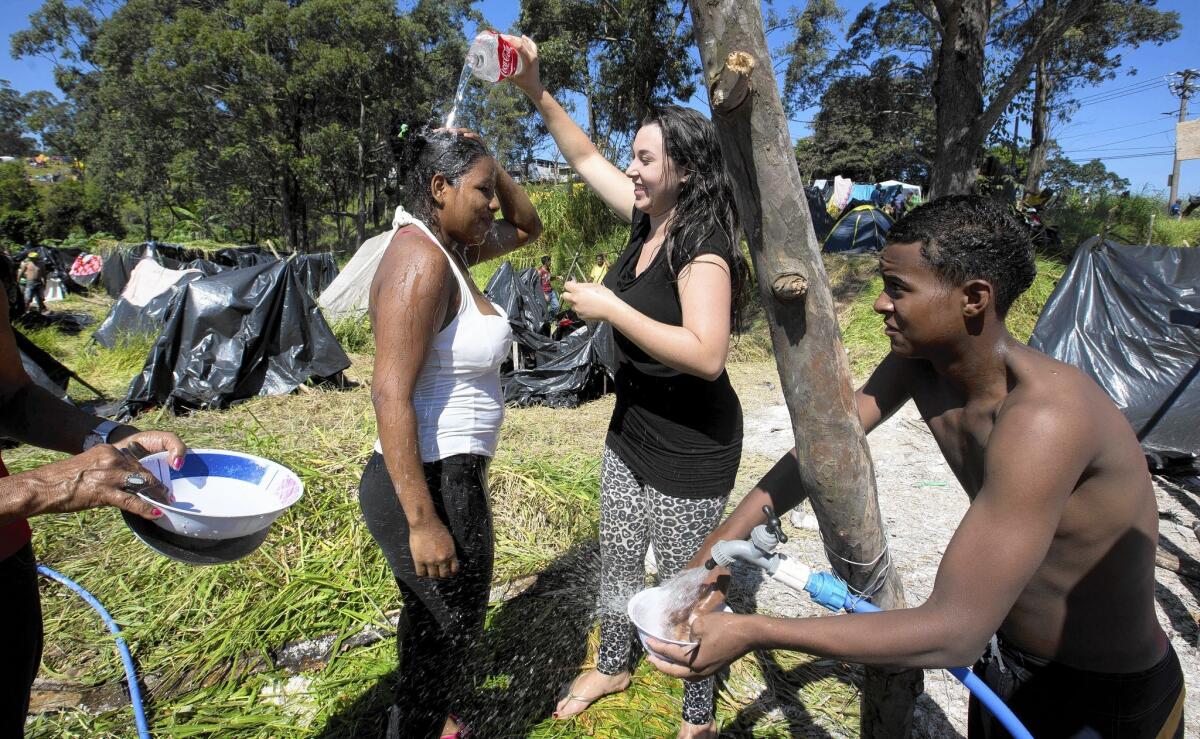Housing protesters occupy land near Brazil World Cup soccer stadium

- Share via
Reporting from Sao Paulo, Brazil — Thousands of families have begun occupying an empty lot near the site of next month’s opening match of the FIFA World Cup, demanding affordable new housing and protesting government expenditures on the international soccer tournament.
In less than a week, the protest organized by Brazil’s Homeless Workers’ Movement, or MTST, has drawn an estimated 7,000 people, persuading President Dilma Rousseff to hold an emergency meeting in which she said she would consider turning the hillside land over to them for housing construction.
Meanwhile, more people are flocking here, taking refuge under black plastic tents held up by sticks they have pounded into the ground. The occupiers cook, chat and play music on their cellphones. They call their settlement the People’s Cup, and say that the $445 million used to build the gleaming new Arena Corinthians stadium below them could have been spent fighting poverty, but instead has served to rapidly increase rental prices in the neighborhood.
“My rent went from $135 to $360 in a matter of months. That’s more than minimum wage, and my sons can’t afford to support me anymore,” 64-year-old seamstress Pedrina Josefina Felix says, standing outside a flimsy tent in the cold as night began to fall Friday.
From the settlement, she can see the just-finished soccer stadium, which will hold 68,000 spectators for the World Cup, in the Itaquera neighborhood on Sao Paulo’s poor outskirts. “It’s beautiful. And there is a good side to the World Cup, and to developing this neighborhood, I suppose. But it doesn’t do any good for those of us who can’t pay rents anymore.”
On Thursday, as Rousseff was due to arrive for a visit to the stadium, the MTST and associated Landless Workers’ Movement coordinated protests around South America’s largest city, including storming the offices of big construction companies. Rousseff then agreed to meet with squatters’ representatives on a helipad near the new stadium.
That night, the squatters announced that they had won a court appeal allowing them to remain on the privately owned land until at least May 23. They say the land has been abandoned for more than two decades and that its owner, who says he plans an industrial project there, doesn’t pay the requisite taxes. As a result, they say, the lot should be used to build housing.
“The people from Sao Paulo’s poor periphery will not swallow the World Cup investments made against the people. Itaquera is rising to defend its rights,” reads the People’s Cup manifesto.
When Brazil was awarded the World Cup, which starts June 12, and the 2016 Rio de Janeiro Olympics, the announcements were met with a wave of national euphoria and boosted a government that promised to present a new face of Brazil to the world. But in the years since, the mood has slowly changed, with only about half of Brazilians now saying the soccer tournament will be good overall for the country.
Critics complain of what they say is wasteful spending on stadiums as public services languish, of reported corruption involving politicians and big construction companies, and worry about possible logistical breakdowns.
The current protest is the latest in a long tradition of occupations of land and buildings in Brazil led by left-wing social groups. For years, the MTST has been active in Sao Paulo, decrying a gaping housing deficit — which the government acknowledges — by moving in and trying to take over idle spaces.
It also comes nearly a year after more than a million people, initially organized by relatively well-off students, took to the streets here to demonstrate against poor schools and healthcare, police violence and corruption. Participants in the World Cup protest, mostly poor and struggling to pay rent or living with relatives or on the street, are hoping something tangible will result from their occupation.
“I had never participated in any movement like this, and didn’t know it was planned. But when I heard, and was told I might get a place, I came running,” said Maria Afrania da Silva, a 27-year-old who lives with her carpenter husband and two children in her mother-in-law’s house. “These are problems we had here long before the World Cup was ever announced. That stadium just brought attention to them.”
Critics say the occupation is illegal and is taking advantage of the looming international tournament to pressure the government.
Sen. Alvaro Dias, with the opposition center-right PSDB party, said Rousseff’s meeting was a “marketing ploy” meant to shore up support in October elections. “It’s obvious she’s doing this because her popularity has dropped,” he told the Folha de S. Paulo newspaper.
“When the government told us we would host the World Cup, we hoped there would be improvements for us. But they aren’t putting on a Cup for the people, they’re putting on a Cup for the gringos,” said Maria das Dores Cirqueira, 44, a coordinator for the MTST.
Nearby, children kicked a soccer ball as adults installed a public sink. Men carried run-down furniture through the tiny passageways between tents.
“No one here is messing around,” says Danilo Vieira Gomes, 26, who works as a trash collector, as a group of friends huddled around a fire, preparing coffee and dinner.
“Only a small part of the government has ever helped us, and the rest is divided between the rich and the corrupt. If this wasn’t serious, we wouldn’t be sleeping out here.”
Bevins is a special correspondent.
More to Read
Sign up for Essential California
The most important California stories and recommendations in your inbox every morning.
You may occasionally receive promotional content from the Los Angeles Times.













